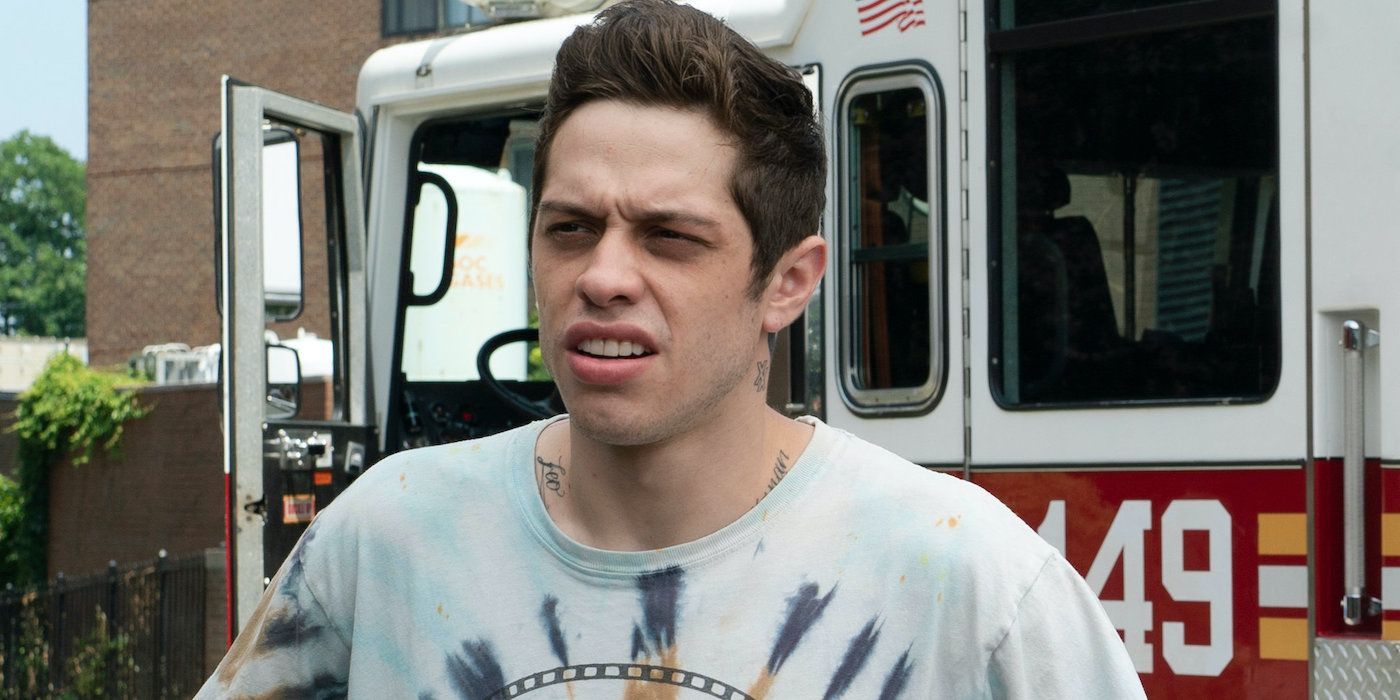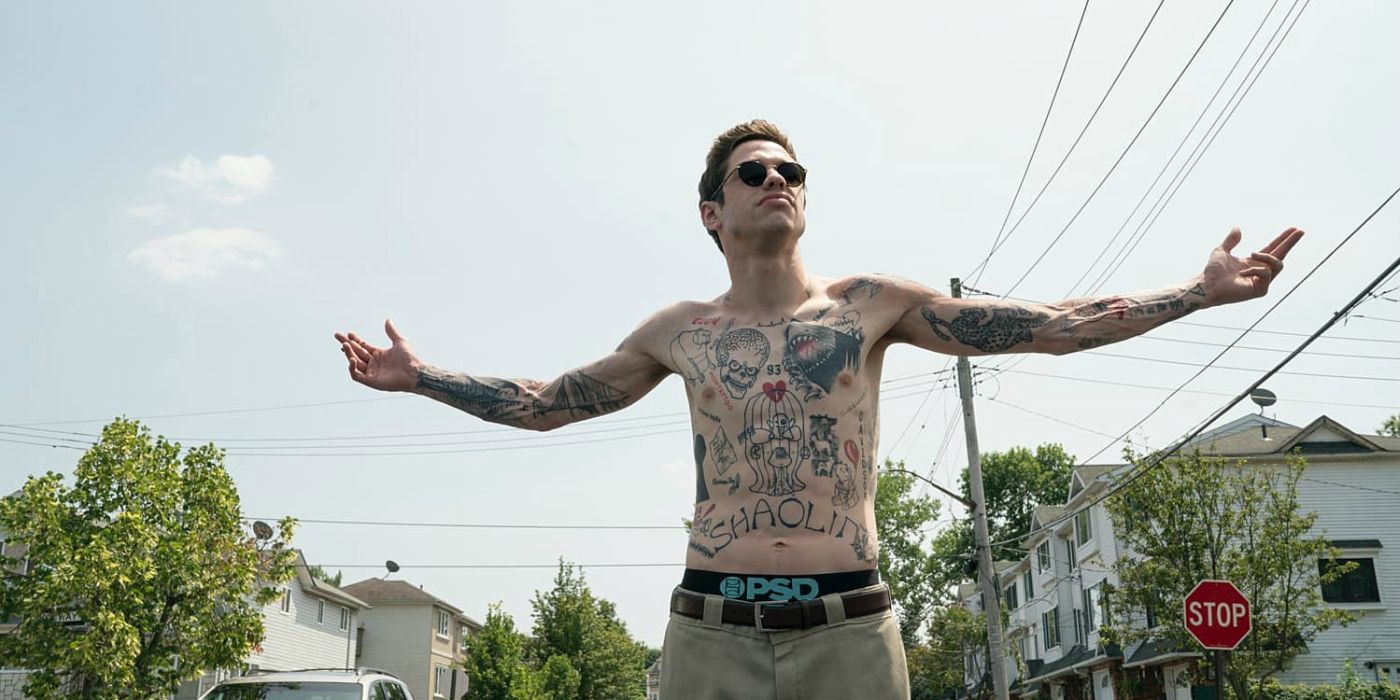Stemming all the way back to classic films like The Graduate and The 400 Blows, coming of age stories are rooted in similar tropes. Often within this genre, a protagonist feels stifled by their hometown, they’re exhausted by their overbearing family, and they hold an internal desperation to flee for a new life in a bigger city. The King of Staten Island, a 2020 film directed by Judd Apatow and co-written by Pete Davidson, who also stars in the film, seems to set up the story for this exact trajectory.
When we’re introduced to Scott (Davidson), his life is in a particularly bleak stasis as he aimlessly drifts around Staten Island. As Scott’s journey unfolds, every event from him being alienated by his family and friends to struggling to find a place to sleep for the night seems like an indicator that Scott will leave Staten Island like his younger sister Claire (Maude Apatow) and discover a new life somewhere far away. However, Apatow and Davidson turn audience's expectations on their head by subverting these classic coming of age tropes in every step of Scott’s character arc. It’s the emotionally resonant writing from Davidson, Apatow, and Dave Sirus that crafts an unpredictable tale, which broke Amazon Prime rental records, with an underlying message about finding the beauty within your hometown.
One of the tropes that appears in many coming of age tales is rooted within the town that the protagonist lives in. Despite the family and townspeople's disapproval, the protagonist often desperately wants to leave. Indeed, in many of these stories, the protagonist must leave in order to find themselves. This disdain and frustration towards the town is often the first part of what establishes the protagonist’s journey. However, Apatow and Davidson write Scott’s character arc in a completely unique way. Instead of forcing him out of Staten Island, Scott’s journey slowly begins to become more about accepting himself as he finds his place within his borough.
In one of the first scenes, a certain offbeat love of Staten Island is established. Scott and his friends watch a deeply violent, gory film, and one of Scott’s friends Igor (Moisés Arias) tells the group with a gentle smile, “I love this movie, they shot this on Staten Island”. The following violent frame on the film they’re watching cements the strange but loving relationship that Scott and his friends have with Staten Island. What’s so uniquely interesting about the writing of Scott’s character, is that despite the lack of aim he has with his friends, and al of the difficulties that come with living at home, he doesn’t want to leave. In large part due to Davidson’s nuanced and sharp performance, it becomes evident that there’s a part of Scott that loves living at home. Although Scott and his mom Margie (Marisa Tomei) have a loving relationship, Margie is deeply concerned about him. An urgent sense of desperation in her voice, she even tells Scott, “I want you to get your own apartment by summer” If Apatow and Davidson had gone the more traditional coming of age dramedy route, Scott’s family would’ve wanted him to stay in Staten Island and follow the same exact path that they did. However, in this case, Scott’s family is so worried about him that they urge him to leave. In one scene, Margie even says of Scott, “He’s really going nowhere”. This sort of mindset even lowers Scott’s self-esteem to one of his worst moments of judgement. When he overhears his mom’s comment, he decides to rob a convenience store with his friends, which turns into a violent shootout. Scott’s shocking, sudden low point feels like a dark diversion from the typical journey that coming of age protagonists go on to find themselves.
Another trope that rises from so many coming of age stories is often regarding the protagonist and their relationship with their love interest. Often, when the protagonist finds love, they make a plan to leave town with them, in search of a new, better life together. Using The Graduate again, the bittersweet final scene ends with Benjamin and Elaine jumping on a bus with no clear destination. All the audience knows is that, for better or worse, they’re going to start a new journey away from the materialism and “plastics” of Benjamin and Elaine’s hometown.
However, this trope is completely subverted with the character of Kelsey, Scott’s on and off girlfriend, and a character that is incredibly well written. In one of the Kelsey’s funniest and most heartfelt scenes, her tremendous love for Staten Island and its people is made clear. It’s the type of scene that could have gone the very obvious route, with group of childhood friends sitting around an abandoned park in their hometown on a sunny day. However, Apatow and Davidson once again turn the trope on its head. A few of the group members begin comparing Staten Island to some trendier, more bustling New York City neighborhoods like Williamsburg. However, Kelsey stands her ground about their home borough, adamant about the fact that she can make it better. Excited even talking about the area, she tells them “There’s no reason we shouldn’t be cool like Brooklyn, we’ve got amazing views, it’s close to the city.” Despite Kelsey’s strong views, Scott is still dubious about Staten Island’s potential. “This place is never gonna change”. She responds strongly, “I love Staten Island. It’s amazing. And people are gonna see it soon.” This marks an important part between Scott and Kelsey’s relationship arc, which later evolves as Scott eventually starts to see the beauty in Staten Island. Kelsey completely forges her own path, which in turn inspires Scott.
Finally, a trope that has become one of the most prevalent staples of coming of age stories is that of the “evil” stepparent. Or at least, a stepparent that clashes severely with the protagonist, and becomes a villainous obstacle that the protagonist must overcome. We see this in everything from an abusive stepparent in Cinderella to the more subtly toxic and arrogant Trent in the brilliant coming of age film The Way, Way Back. When Ray Bishop (Bill Burr) is first introduced in the film, there’s immediate tension between him and Scott, which is amplified further when Ray begins dating Margie. As the film progresses, however, this evil stepparent trope is subverted as they form a close bond and start to realize how similar they actually are.
Indeed, when Ray Bishop is first introduced in the film, there’s immediate tension. Scott encounters Ray’s 10-year-old son Harold (Luke David Blumm) by the beach while he’s tattooing his friends, and, against his better judgement, gives Harold a tattoo. This subverts one aspect of this stepparent trope. In many of these coming of age films, the abuse or toxicity is totally uncalled for and the protagonists do nothing to warrant the contempt from their new parent. In this case, Scott’s clearly obscene decision sets himself up for his tension with Ray. As a result, the beginning of their relationship is rocky. Scott is hesitant towards Ray, and Ray can’t stand Scott. It becomes even more tense when Ray starts to date Margie and as they’re forced to spend more time together. In a line that encapsulates their distinct conflict, Ray yells at Scott, “I tried giving you direction, you’re too busy smoking your fucking weed!” However, when Scott eventually ends up without a place to stay, he has no choice but to turn to Ray. Their conflict turns to a close bond, and Ray even tells Scott, “I want to see you do well. I believe in you.” It becomes clear by the end that Ray isn’t somebody that Scott needs to desperately run away from. They’re both simply wanted connection with each other, and needed to look past their insecurities and pride to see that.
By the end of the film, it might seem like the trope of Scott leaving town with his love interest will be solidified. Scott finds Kelsey on her way to take her civil service exam in Manhattan and jumps on a ferry with her. However, in the style of the film, this trope is subverted yet again. Kelsey turns to Scott before she makes her way into the building and asks, “Will you wait for me while I do it, and then we can go back to Staten Island together?” Scott agrees, and despite the fact that in the final frame Scott looks in awe at the bustling borough of Manhattan, we know that Scott will go back to Staten Island with Kelsey. In many of these coming of age stories, the protagonist progresses by leaving. Instead of fleeing for something else, though, Scott progresses as a character by staying. As a result, he finds the beauty of Staten Island, as the title suggests, the borough becomes a small kingdom for him.




